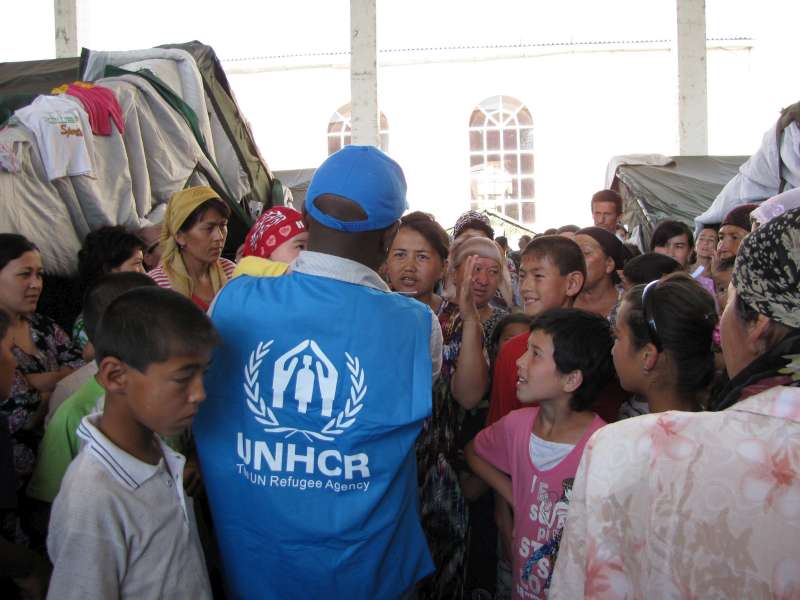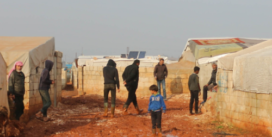- Fall Newsletter, 2025, Issue 15
- Using International Online Learning Modules to Engage Students in the Study of Critical Global Issues
- Upcoming Book Launch: Hearts of Freedom
- Announcing winners of the 2025 CARFMS Essay Contest
- The New York Declaration for Refugees and Migrants and its two Global Compacts: Addressing the Symptoms or the “Root Causes” of Forced Displacement?*
CARFMS16: Call for papers

Freedom of Movement: Exploring a Path from Armed Conflict, Persecution, and Forced Migration to Conflict Resolution, Human Rights, and Development
9th Annual Conference of the Canadian Association for Refugee and Forced Migration Studies (CARFMS)
Hosted by
the Conflict Resolution Studies Department of Menno Simons College, a College of the Canadian Mennonite University located at the University of Winnipeg
in
Winnipeg, Manitoba, CANADA
Home of the Canadian Museum for Human Rights
11–14 May 2016 (inaugural address by Carol Batchelor (Director of the Division of International Protection of the UN High Commissioner for Refugees) will be on the evening of May 11, 2016)
(Please note that the submission deadline has been extended to November 30, 2015)
Article 13 of the Universal Declaration of Human Rights states: (1) Everyone has the right to freedom of movement and residence within the borders of each state; and, (2) Everyone has the right to leave any country, including his or her own, and to return to his or her country. Unfortunately, people in situations of persecution, armed conflict, and displacement are prevented from exercising their right to freedom of movement. The Office of the United Nations High Commissioner for Refugees (UNHCR) estimates in the 2014 Global Trends Report that war, conflict, and persecution have displaced some 60 million people worldwide, resulting in the highest level since records have been kept. Of these people, 20 million are displaced across borders, with more than half of this refugee population comprised of children. Since its inception in 2011, the Syrian crisis has produced a total of 11 million internally displaced people and refugees. New waves of “boat people,” displaced by violence, are crossing the Mediterranean Sea, the Bay of Bengal, and entire oceans to seek asylum, safety, and freedom. Many perish on their dangerous journeys, and others who arrive at their destinations are refused entry or detained.
Much of the responsibility falls on the world’s developing countries, who host nine out of ten refugees. Neighbouring countries, governments, and humanitarian organizations struggle to deal with the social, economic, and political ramifications of these situations. The minority who are resettled face numerous integration issues.
The 2016 CARFMS Annual Conference will gather a diverse group of stakeholders such as academics, researchers, students, government officials, lawyers and lawmakers, community organizations, and practitioners (including from non-governmental organizations) to discuss the question: What strategies can host states, origin states, the international community, private citizens, and civil society undertake to fulfill their collective responsibility to address these escalating global forced migration crises? From interdisciplinary perspectives and diverse regional backgrounds, we invite participants to explore, examine, and recommend theories, policies, and practical responses to the theme of freedom of movement in the context of:
- Conflict Resolution and Peacebuilding;
- Human Rights;
- Development; and,
- Methodology and Knowledge Production.
We welcome proposals for individual papers, organized panels and roundtables, film screenings, video documentaries and news media clippings, or poster/photo exhibits around these broad sub-themes.
- Conflict Resolution and Peacebuilding
Conflict resolution, peacekeeping, and peacebuilding have the potential to engage people across grassroots to top-level leadership in working towards peaceful relationships and communities. This sub-theme explores and analyzes the interests, motivations, and practices of conflict resolution, peacekeeping, and peacebuilding in addressing social justice and positive peace for refugees and other migrants. How do we commit to conflict resolution, peacekeeping, and peacebuilding practices that address the right to seek asylum in situations of war, armed conflict and persecution? How do structural factors and other root causes (systemic or institutionalized discrimination, cultural imperialism, power-based systems) impact migration and resettlement? How do governments, NGOs, and other actors participate in the different roles, structures, and processes that support or impede freedom of movement? What role can refugees and diaspora communities play in conflict resolution activities that will contribute to post-conflict development, security, and transitional justice? Can freedom of movement and the right to asylum be strategies for conflict transformation?
- Human Rights
Freedom of movement and asylum are fundamental human rights. This sub-theme explores both the actualization and denial of these rights. How are various human rights instruments used to facilitate movement? Who are the actors (individuals, organizations, communities, and governments) who enable movement? What legal and regulatory frameworks can and have been implemented to respect the right to freedom of movement? What restrictions (legal, judicial, administrative or otherwise) serve to prohibit, complicate, or reduce movement and asylum? How does freedom of movement interact with other human rights? Where is the intersection between the human right of freedom of movement and the refugee’s right to non-refoulement?
- Development
Improving the livelihoods of people migrating due to war, armed conflict, and persecution is imperative. This sub-theme invites contributions that examine innovative strategies for improved livelihoods through economic, social, environmental, and political change in situations of war, armed conflict and persecution. Creating safe and sustainable environments, meeting human needs, and addressing social justice issues are keys to freedom of movement. In situations of short- and long-term displacement, what strategies ensure the timely provision of sufficient, nutritional, and culturally-appropriate food? In protracted displacements, what key strategies enhance skills and develop vocations and small businesses to provide opportunities for young people, increase family income, and build resilience? Considering that the vast majority of migrants are women and children, how do gender considerations inform development planning and implementation? What practices result in meaningful engagement in the decision-making processes that impact the lives of refugees and forced migrants while ensuring peaceful co-existence with host communities?
- Methodology and Knowledge Production
Research in the contexts of migration, war, armed conflict, extreme violence, and serious human rights violations, and development poses particular epistemological, methodological, and ethical questions. This sub-theme explores how knowledge is created, under what structural constraints, and for what purposes. How can non-academics, including forced migrants themselves, overcome structural and epistemological barriers to contributing to research and scholarship? What are the opportunities and challenges of interdisciplinary research in this area? To what extent do standard research methods need to be adapted to the particular political and practical contexts of war, armed conflict, development, and migration? Is there a need for greater cross-pollination of ideas across conflict studies, development studies, and migration studies? What are the particular ethical challenges of research with forced migrants, and how can these be addressed?
SUBMISSION OF ABSTRACTS
Individuals wishing to present a paper, organized panels and roundtables, film and video documentaries and news media clippings/exhibits, or poster/photo exhibits must submit a 250-word abstract and 100-word biography.
Organized panel proposals or roundtables must include a general title, a 250-word abstract and a title of each paper, as well as 100-word biography of each presenter forming the panel or roundtable.
Please submit your abstract directly online: http://tinyurl.com/ox6oeo2 by November 30, 2015 (note the deadline extension).
We invite filmmakers or producers to submit video documentaries as well as those who wish to present materials in support of their organizations and/or causes, that are directly related to refugees and other forced migrants, to request space on our conference display tables. Please submit a brief outline of your organization and what materials you wish to have included on your display table and whether you will have someone available to answer conference participants’ questions regarding your organization and/or your cause and/or campaign.
More information about the conference can be found on the CARFMS/ACERMF website: http://carfms.org/conferences/9th-annual-conference/. Please keep checking back for updates.
For more information, please contact:
Michele Millard
Centre for Refugee Studies
CARFMS Secretariat
Tel: 416-736-2100 ext. 30391
Email: mmillard@yorku.ca
www.yorku.ca/crs
www.refugeeresearch.net
